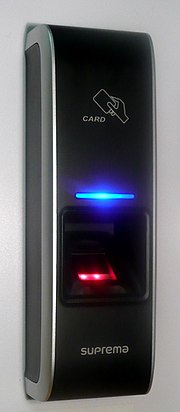Card reader

IP fingerprint reader
|
|
| Media type | |
|---|---|
| Capacity | 10000 templates |
| Developed by | Suprema Inc. |
| Usage | fingerprint identification, access control |

Proximity reader with keypad
|
|
| Developed by | Elko International |
|---|---|
| Usage | access control |
A card reader is a data input device that reads data from a card-shaped storage medium. The first were punched card readers, which read the paper or cardboard punched cards that were used during the first several decades of the computer industry to store information and programs for computer systems. Modern card readers are electronic devices that can read plastic cards with either a barcode, magnetic strip, computer chip or another storage medium.
A memory card reader is a device used for communication with a smart card or a memory card. A magnetic card reader is a device used to read magnetic stripe cards, such as credit cards. A business card reader is a device used to scan and electronically save printed business cards.
A smart card reader is an electronic device that reads smart cards and can be found in the following form:
External devices that can read a Personal identification number (PIN) or other information may also be connected to a keyboard (usually called "card readers with PIN pad"). This model works by supplying the integrated circuit on the smart card with electricity and communicating via , thereby enabling the user to read and write to a fixed address on the card.
If the card does not use any standard transmission protocol, but uses a custom/proprietary protocol, it has the communication protocol designation T=14.
The latestPC/SC specifications define a new smart card framework. This framework works with USB devices with the specific device class 0x0B. Readers with this class do not need device drivers when used with PC/SC-compliant operating systems, because the operating system supplies the driver by default.
...
Wikipedia
